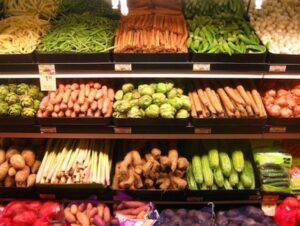Does Organic Produce Spoil Faster than Conventional?

There are the obvious perks to consuming organic produce over conventional produce. Organic produce is not treated with the harsh chemicals that conventional produce is and is thus a better option when it comes to a healthy dietary lifestyle. But does conventional produce have a longer shelf like than organic produce?
The short answer is maybe. In the general, intuitive sense, organic produce is “cleaner” than conventional produce due to there being less harsh chemicals used to treat it while growing. Because of this, organic produce may be more vulnerable to the elements and bacteria build-up, thus retaining a shorter lifespan (rather, more in tune with how long Mother Nature intended it to be ripe and fresh). Conventional fruits and vegetables are treated with the expectation to be more resilient, both during growing and afterwards, and chemicals may play a prominent role in doing just that. However, this isn’t exactly what we experience on a day to day basis, as there are so many factors to explain the spoiling of fruits and vegetables – organic or not – that have nothing to do with how they are grown.
Before you put organic produce on the altar it doesn’t quite deserve, remember that organic fruits and vegetables are supported by their own set of additives that help them grow. Just because a piece of fruit or vegetable is labeled as “organic” doesn’t mean it’s in its purest, most unadulterated form. Organic farmers are allowed to use pesticides too, as long as they derive from natural sources. Organic farmers can even use pesticides that contain synthetic substances under the regulations of the USDA’s National Organic Program (NOP) if other tactics and cultural management practices fail to control pests and diseases. In the end, organic farmers are still strictly limited in terms of the chemicals they can use to control pests and must resort to plant and mineral-based ingredients and microorganisms.
But are the differences in the way organic produce and conventional produce is grown mean one set spoils faster than the other? According to the research conducted by MSNBC consumer correspondant Janice Lieberman, the shelf life of organic foods are shorter. She tested lettuce and broccoli and found that they had higher levels of the kind of bacteria that cause food to spoil (not the kind that cause illness). If her small research study is any indication of most produce, then organic produce should spoil faster than its conventional counterpart.
Additionally, because organic fruits and vegetables are not treated with waxes or preservatives to the same degree that conventional fruits and vegetables are, they may indeed spoil faster.
But, this is not where the conversation ends.
The reason for the accounts of faster-spoiling organic produce is not necessarily rooted in the use or quality of chemicals during growth . The production, handling and delivery of the produce are all factors that also determine how soon a certain fruit or vegetable will spoil.
One theory is that the distribution systems for organic products are not as well developed as they are for conventional products. This delays the arrival or organic produce to grocery stores and thus causes it to not last as long after purchased.
Meanwhile, others swear that that their organic produce often outlives their conventional produce, lending fodder to the theory that distribution plays a key role in determining freshness. It is practically impossible to know how long produce has been on a shelf or en route to the grocery store or market before you purchase it.
But if you’re questioning whether or not to choose organic because it may spoil more quickly, consider this: Organic fruits and vegetables do not contain as many toxic additives and boast 19 to 69 percent more antioxidants than conventional fruits and vegetables. And, let’s be real, we could all do with a fewer pesticides in our lives. If indeed organic produce spoils faster, it’s a small price to pay. Organic produce is both a healthier and more environmentally-friendly choice.
To ensure you get the best organic produce available, purchase it from a local farmer’s market, where you can talk to the farmers themselves and inquire about the distribution process and how they grow and harvest their goods.
Related on Organic Authority
The Ideal Approach to Storing Produce
6 Cool Food Apps that Make Food Safer
Photo Credit: rick

